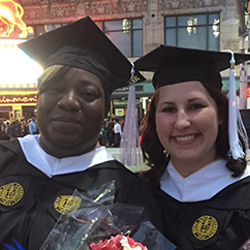Alumna Toycia Collins '15 '17 researches Auntie Na's Village to examine the impact of community service
By Hannah Naimo

Attending Wayne State and living in Detroit encouraged Toycia Collins B.A. '15, M.S. '17 to find ways to help Detroiters through community service, culminating in her research of community service organizations.
After moving from Jamaica to Detroit, Collins went on to obtain a Bachelor of Arts in Journalism in 2015 and a Master of Science in Criminal Justice from Wayne State in 2017.
In 2018, Collins had her first opportunity to work with sociologist and"¯Dean of WSU's College of Liberal Arts and Sciences Stephanie Hartwell.
They started a research project to better understand the impact of polarized urbanism on the city's revitalization. "I did some work in the city, and people were complaining about the revitalization happening in Midtown and downtown but not necessarily in the neighborhoods," said Collins.
This expansive legacy project aims to better the lives of people living in Detroit and seek ways to break down the barriers that separate different demographics in the city."¯
A significant contributor to the study was Auntie Na's Village. Auntie Na saw the needs of her community and developed ways to bring resources such as food pantries to residents with limited access to healthy food. She also helped residents access transportation needed to visit doctors or other necessary appointments.
What started as being a helpful neighbor turned into an organization with regular volunteers and partnerships within the community and Wayne State."¯Her efforts were the inspiration for Collins and Hartwell's research and helped spark ways that they could help further growth in the community.
"We wanted to understand why she did this, how she got this project going, and if this could be replicated," said Collins."¯

Collins noted that focus groups and meetings were instrumental in getting a close look into the lives of Detroit residents impacted by various social issues. People were facing blight, high levels of incarceration, food insecurity, obesity, low annual income, a lack of reliable internet access and high levels of tobacco use.
The team noted that residents living in these service deserts experienced increased vulnerability to COVID-19 due to a lack of resources and the compounded impacts of outmigration, depopulation, blight and social decay. This led to a separation of populations regarding information dispersion on health-related issues such as COVID-19.
These unmet needs create a barrier that limits the access some people have to a high quality of life. Hartwell explained these issues as isolating for these populations, creating a disconnect from public health-related media.
Hartwell believes that research findings like these are essential for a better understanding of Detroit and other urban areas. She expressed the need to guide the city toward growth and positive change while keeping all populations in mind.
"The lessons from these residents in dealing with the dichotomy of Detroit's revitalization can guide other cities on the nuanced elements of resurgence without leaving behind the periphery populations," said Hartwell.
The team's research was internationally recognized in Lyon, France, at the"¯International Academy of Law and Mental Health. There Hartwell and Collins presented a pilot program called the Educational Transition Coordination Project, a product of the team's research. This program aims to create a pipeline from prison to higher education to strengthen the community.
Read the full article"¯to learn more about this research and how it impacts the residents of Detroit.
Alumni Week of Service is Oct. 15-22. Are you ready to make an impact alongside others this year?